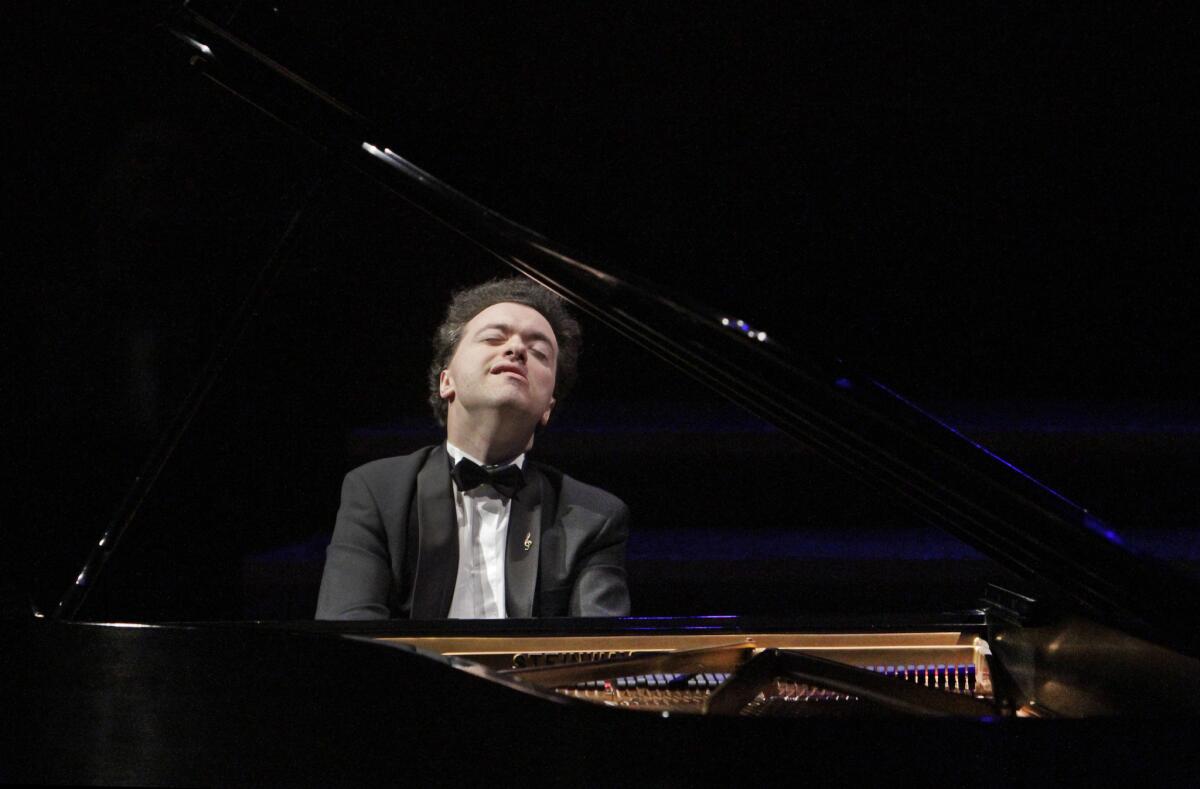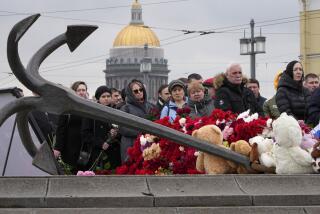Music review: Evgeny Kissin puts distinct Russian stamp on Schubert

There was no contesting yet another Russian annexation Monday night. Rather than the supposed 93% majority in Crimea that voted to succeed from Ukraine a week earlier, what appeared to be 100% of the audience at Walt Disney Concert Hall vociferously cheered in favor of Evgeny Kissin Russianizing Schubert.
The occasion was a fabulous, if highly personal, performance by the Russian pianist of Schubert’s big, outgoing Sonata in D Major, D. 850. That was followed by the most commanding Scriabin playing I’ve ever heard accorded the Russian mystic composer in concert. That was followed by the 42-year-old Kissin, Soviet trained, giving his typically stiff and formal Soviet-style bow.
The evening was a massive Russian triumph. There was plenty to make Putin proud. And just as much not to.
PHOTOS: Best classical concerts of 2013 | Mark Swed
As far as I know Kissin hasn’t taken a stand on the state of Russia these days, and no one need expect him to. Famous since childhood, he left his homeland in 1991, a Russian Jew getting out as soon as possible the year of the Soviet Union dissolution. He recently told The Times that he retains his Russian citizenship, but he also holds British as well as Israeli citizenship. He says he can feel at home anywhere he plays, and that includes on his occasional visits to Moscow, where he grew up.
But wherever Kissin plays, whatever he plays and whatever his political views may be, he remains a great and possibly the great native Russian pianist of our day. He conveys the distinctively booming Russian piano sound, as thick and rich and satisfying as beet borscht with the kind of sour cream you can find nowhere but Russia. He conveys the distinctively weighty Russian soul more effectively than ever as he continues to mature impressively.
All of that made Kissin’s recital more than a little relevant to the moment, when just a few hours earlier in The Hague the Group of Eight voted to remove Russia, with the U.S. and its now six allies angry over Russia’s military involvement in the dispute over Crimea. Politics is ever based on self-interest, justifications come from oversimplification, and art’s role can be to reveal how much culture matters.
What is deep in the Russian psyche stays deep in the Russian psyche. The better we are at opening our own psyches to that, the better we become in understanding how nationalism works and where our common interests may in fact be buried.
PHOTOS: Faces to watch 2014 | Classical music
Kissin’s Schubert was not Schubert’s Schubert. For that, you might turn to Harvard musicologist Robert Levin playing an 1825 Viennese fortepiano from the year when and place where Schubert wrote his sonata. The result is a fascinating transparency, with rhythmic accents pointed in the right direction and a striking emphasis on Schubert’s harmonic daring.
Nothing could be further from Kissin’s approach. He threw his body along with his soul into the piano. It was a physical thing as well as a musical one. His quest was to make a modern concert grand resonate in ways Schubert could have only dreamed.
The first movement became a study in propulsion and finding common purpose when Schubert radically changes the music character. In the second, Kissin became a machine of melting, mesmerizing lyricism. Near the movement’s end, Schubert interrupts a rhythmically emphatic climax with a surprise change of harmonic direction and a quiet coda. Here Kissin simply stopped all movement, as if demonstrating how contemplating an unexpected radical idea can change your mind.
Kissin didn’t dance in the dance-like scherzo but instead went at a gallop. He didn’t gallop in the happy rondo but instead slowed down and took measure of what it meant to gallop. This was profound playing.
GRAPHIC: Highest-earning art executives | Highest-earning conductors
For the Scriabin second half of his recital, Kissin stuck with the early works written at the end of the 19th century just as the composer was finding his voice by merging Chopin’s piano style with his own exotic sensibilities. Scriabin’s sensibilities included the thinking of harmonies as colors, and the thinking of music as a sure road to diabolical and sexual ecstasies.
The two-movement Second Sonata travels from the unearthly to the frenetically corporeal and is the first real indication of the composer mastering his dark powers. Kissin played it with an extravagant effusiveness. Unlike Yuja Wang who used the sonata in her recital last year as a kinetic study, Kissin was more concerned with the ultimate power of sound and ineffable expression. In this he enters into the exclusive company of the greatest Scriabin pianist of all time — Vladimir Sofronitzky a half century ago.
Kissin ended with seven of Scriabin’s 12 Opus 8 etudes. These are showpieces by a composer in his early 20s who also happened to have an exceptional piano technique. Vladimir Horowitz found the last one, in D-sharp-minor, good for showing off.
Kissin played the etudes masterfully, happy to oblige with keyboard thrills. He made them sound like they were significant music rather than emblems of Scriabin’s significant music to come.
It would have been nice to hear all 12 etudes (a rarity in concerts and even on recording from major pianists). It would have been nice to hear Kissin’s magic contend with the black magic of Scriabin’s late music.
But it was also more than just nice to hear this Scriabin group of seven matter.
More to Read
The biggest entertainment stories
Get our big stories about Hollywood, film, television, music, arts, culture and more right in your inbox as soon as they publish.
You may occasionally receive promotional content from the Los Angeles Times.







